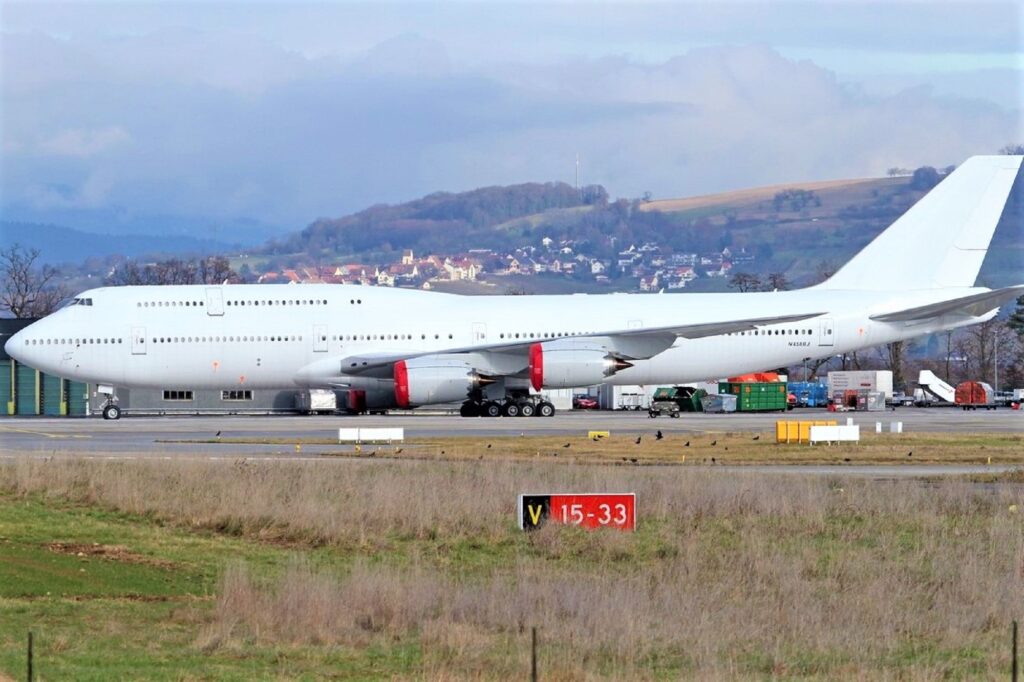A Boeing 747-8 Business Jet (BBJ), the most luxurious ‘Queens of the Skies’ aircraft, will be dismantled at the Pinal Airpark boneyard in Marana, in the United States on December 19, 2022.
The giant passenger plane, registered N458BJ, is the world’s first 747-8 airframe to be scrapped after less than 30 flight hours spent in service and just 10 years after it was delivered to its owner, AeroTelegraph reported.
The short lifespan of a VIP aircraft
The Boeing 747-8 BBJ was expected to become a special government plane to operate flights for the Saudi Arabian government, particularly to serve Saudi Crown Prince Sultan Abdul Aziz. However, the prince died unexpectedly in October 2021, around nine months before the scheduled delivery.
According to Planespotters.com data, in December 2012, five months after the aircraft was rolled out of the Boeing factory, the plane was ferried to EuroAirport Basel Mulhouse Freiburg Airport (BSL) located in the border tripoint between France, Germany, and Switzerland, where it was scheduled to undergo interior modifications.
Since then, there have been several attempts to sell the aircraft for around $95 million (or one-fifth the value of the new 747-8 at the time) but attempts to find a new owner for plane that has barely flown have failed. The BBJ, which is painted with a white livery, remained parked at BSL airport for more than a decade until April 2022, when the plane was ferried to one of the world’s largest aircraft graveyards in the Arizona desert. It was there that its most valuable parts, the four General Electric GEnx turbofan engines, were removed.
While the aircraft has not yet been fully scrapped, its wing flaps, some parts of the tail and fuselage, as well as the rudder have already been dismantled.
The 747-8 had reportedly operated only 16 flights and spent just 29 hours in the sky.
A flying mansion
The 747-8 BBJ aircraft is positioned as the world’s largest business jet currently in active operation, which also falls into a list of the world’s most expensive jets dedicated to serving private customers. When measured from nose to tail, the jet equals 76.2 meters (250 feet).
Based on Boeing’s commercial passenger aircraft, the 747 ‘Queen of the Skies’, the BBJ product line consists of VIP-configured variants dedicated to serving as widebody executive airliners.
The General Electric GEnx is the only engine available to power the 747-8 VIP, which provides the bizliner with one of the highest ranges of any other aircraft manufactured by the American planemaker.
According to Boeing, the private version of the ‘Queen of the Skies’ can fly a range of 16,537 kilometers (8,929 nm) and can carry 100 travelers on board. The aircraft also offers 444.63 square meters (4,786 square feet) of cabin space. For comparison, the commercial passenger aircraft version of this aircraft has a range of 15,000 kilometers (8,000 nm) at Mach 0.855 when carrying 467 passengers in a three-class configuration.
The VIP jet boasts an upgraded flight deck as well as an improved wing design with raked wingtips, spoilers, ailerons, double-slotted inboard flaps, and single-slotted outboard flaps. Its wingspan reaches 68.5 meters (224.8 feet).
Much like its commercial variant, the 747-8 VIP utilizes numerous technologies developed for Boeing 787 Dreamliners. This includes flight deck technologies and instrumentation, engines, as well as wing configuration.
However, the customized interior of a tri-level widebody business jet may require a significant financial investment. It can be fitted with a stateroom, lounges, bespoke storage units, a master bedroom suite, a kitchen, several offices, a conference room, and an enormous dining room. It could also be fitted with private sleeping suites above the main deck, between the upper deck and the tail.
As of December 2022, a total of nine Boeing 747-8 BBJs are currently left in active service operating flights for the Egyptian, Kuwait, Qatar, Turkish, and Moroccan Governments.

